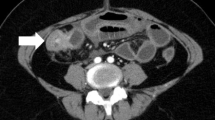Abstract
A 57-yr-old female was referred for screening colonoscopy because of a positive family history of colon cancer. A lobulated tumor mass was detected in the sigmoid colon. The resected specimen showed an invasive adenocarcinoma without lymph node involvement. Later colonoscopic evaluations and CT imaging failed to reveal definite evidence of recurrent disease but a late rising carcinoembryonic antigen level led to FDG-PET scanning and the detection of suspect lymph nodes in the retroperitoneum. Further histopathological and immunohistochemical evaluation of resected lymph nodes confirmed metastatic carcinoma from the primary colon carcinoma with extra-nodal spread. This case underscores the ongoing need for additional evidence-based studies on evolving imaging modalities used in the diagnosis and management of colonic cancer.
Similar content being viewed by others
References
Rex DK, Johnson DA, Lieberman DA, Burt RW, Sonnenberg A. Colorectal cancer prevention 2000: screening recommendations of the American College of Gastroenterology. Am J Gastroenterol 2000;95:868–877.
Smith RA, von Eschenbach AC, Wender R, et al. American Cancer Society guidelines for the early detection of cancer: update of early detection guidelines for prostate, colorectal, and endometrial cancers. CA Cancer J Clin 2001;51:38–75.
Winawer S, Fletcher R, Rex D, et al. Colorectal cancer screening and surveillance: clinical guidelines and rationale—update based on new evidence. Gastroenterology 2003;124:544–560.
US Preventive Services Task Force. Screening for colorectal cancer: recommendation and rationale. Ann Intern Med 2002;137:129–131.
Ransohoff DF. Colon cancer screening in 2005: status and challenges. Gastroenterology 2005;128:1685–1695.
Kwon RS, Sahani DV, Brugge WR. Gastrointestinal cancer imaging: deeper than the eye can see. Gastroenterology 2005;128:1538–1553.
Israel O, Mor M, Guralnik L, et al. Is 18F-FEG PET/CT useful for imaging and management of patients with suspected occult recurrence of cancer? J Nucl Med 2004;45:2045–2051.
van Kouwen MC, Oyen WJ, Nagengast FM, Jansen JB, Drenth JP. FEG-PET scanning in the diagnosis of gastrointestinal cancers. Scand J Gastroenterol Suppl 2004;241:85–92.
Larson SM, Schoder H, Yeung H. Positron emission tomography/computerized tomography functional imaging of esophageal and colorectal cancer. Cancer J 2004;10:243–250.
Hernandez BY, Frierson HF, Moskaluk CA, et al. CK20 and CK7 protein expression in colorectal cancer: demonstration of the utility of a population-based tissue microarray. Hum Pathol 2005;36:275–281.
Clinical Outcomes of Surgical Therapy Study Group. A comparison of laparoscopically assisted and open colectomy for colon cancer. N Engl J Med 2004;350:2050–2059.
Maurel J, Launoy G, Grosclaude P, et al. Lymph node harvestreporting in patients with carcinoma of the large bowel: a French population-based study. Cancer 1998;82:1482–1486.
Johnson PM, Malatjalian D, Porter GA. Adequacy of nodal harvest in colorectal cancer: a consecutive cohort study. J Gastrointest Surg 2002;6:883–888.
Cianchi F, Palomba A, Boddi V, et al. Lymph node recovery from colorectal tumor specimens: recommendation for a minimum number of lymph nodes to be examined. World J Surg 2002;26:384–389.
Wright FC, Law CH, Last L, et al. Lymph node retrieval and assessment in stage II colorectal cancer: a population-based study. Ann Surg Oncol 2003;10:903–909.
Baxter NN, Virnig DJ, Rothenberger DA, Morris AM, Jessurun J, Virnig BA. Lymph node evaluation in colorectal cancer patients: a population-based study. J Natl Cancer Inst 2005;97:219–225.
Sarli L, Bader G, Iusco D, et al. Number of lymph nodes examined and prognosis of TNM stage II colorectal cancer. Eur J Cancer 2005;41:272–279.
Ratto C, Sofo L, Ippoliti M, et al. Accurate lymph node detection in colorectal specimens resected for cancer is of prognostic significance. Dis Colon Rectum 1999;42:143–154.
Eggertson L. Radiologists, physicians push for PET scans. CMAJ 2005;172:1670–1671.
Juweid ME, Cheson BD. Positron-emission tomography and assessment of cancer therapy. N Engl J Med 2006;354:496–507.
Patt YZ, Lamki LM, Shanken J, et al. Imaging with indium 111-labeled anticarcinoembryonic antigen monoclonal antibody ZCE-025 of recurrent colorectal or carcinoembyronic antigen-producing cancer in patients with rising serum carcinoembryonic antigen levels and occult metastases. J Clin Oncol 1990;8:1246–1254.
Patt YZ, Podoloff DA, Curley S, et al. Monoclonal antibody imaging in patients with colorectal cancer and increasing levels of serum carcinoembryonic antigen. Experience with ZCE-025 and IMMU-4 monoclonal antibodies and proposed directions for clinical trials. Cancer 1993;71(12 Suppl):4293–4297.
Libutti SK, Alexander HR, Choyke P, et al. A prospective study of 2-(18F)fluoro-2-deoxy-d-glucose/positron emission tomography scan, 99mTc-labeled arcitumomab (CEA-scan), and blind second-look laparotomy for detecting colon cancer recurrence in patients with increasing carcinoembryonic antigen levels. Am Surg Oncol 2001;8:779–786.
Arulampalam TH, Ledermann J, Costa DC. Asymptomatic patient with an increasing concentration of CEA. Lancet Oncol 2001;2:172.
Israel O, Mor M, Guralnik L, et al. Is 18F-FDG PET/CT useful for imaging and management of patients with suspected occult recurrence of cancer? J Nucl Med 2004;45:2045–2051.
Even-Sapir E, Parag Y, Lerman H, et al. Detection of recurrence in patients with rectal cancer: PET/CT after abdomino-perineal or anterior resection. Radiology 2004;232:815–822.
Author information
Authors and Affiliations
Corresponding author
Rights and permissions
About this article
Cite this article
Freeman, H.J. Asymptomatic familial colon cancer with Fdg-Pet scanning for recurrent disease. Int J Gastrointest Canc 36, 163–169 (2005). https://doi.org/10.1385/IJGC:36:3:163
Issue Date:
DOI: https://doi.org/10.1385/IJGC:36:3:163




